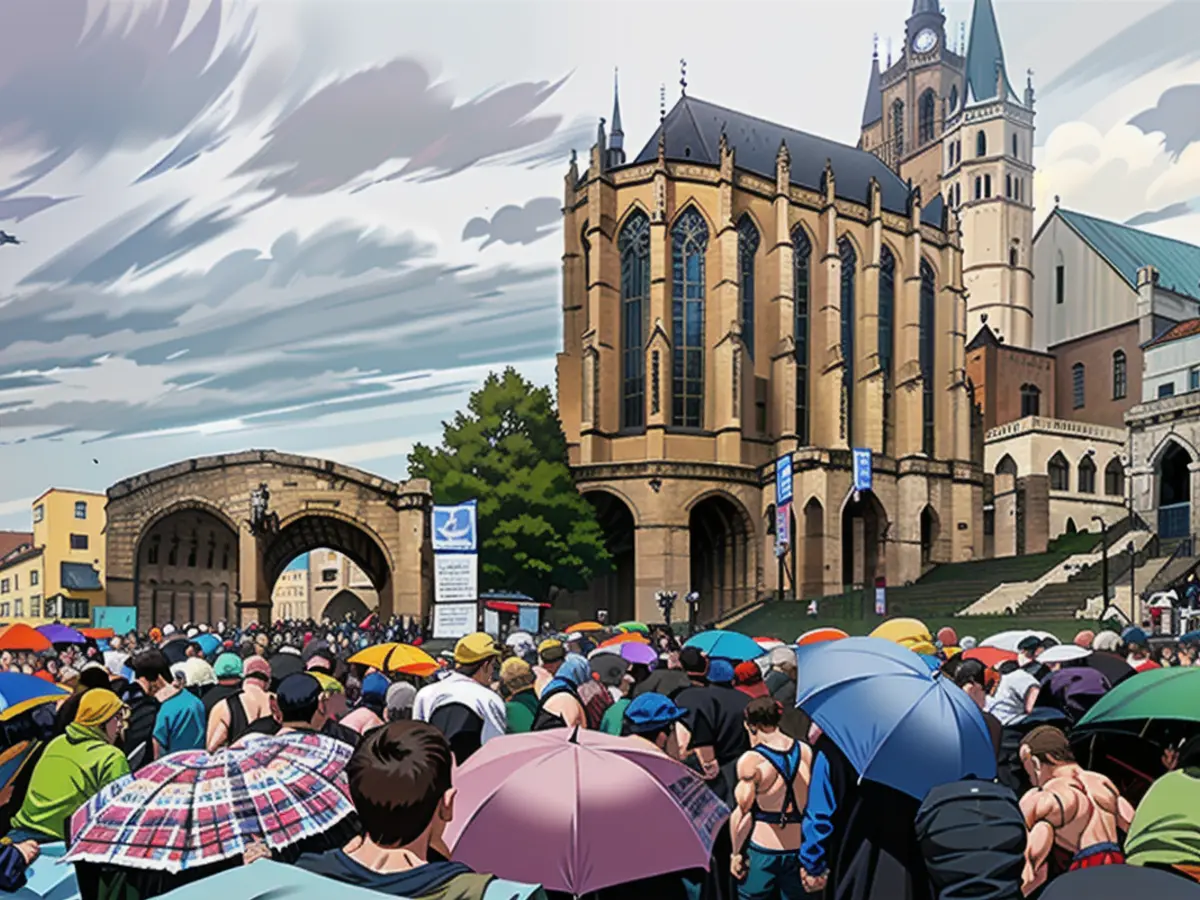Religious institution undergoes transformation. - Discussion and arguments: Scholz at the Catholic Day
Federal Chancellor Olaf Scholz temporarily lost his composure. "[I really enjoy that] - my favorite thing is interacting with citizens," the chancellor stated at the Catholic Day on Friday. The subject matter was critical at the theater in Erfurt: "Stronger communities, shaping society - Our obligation for democracy." The discussion revolved around major crises amid distrust, hatred, and hate speech. A challenging predicament had already occurred for Scholz that morning.
Following approximately ten minutes of podium discourse, dissidents from the Last Generation protest group started chanting slogans among the approximately 800 attendees. "Democracy demands sincerity" and "Does the future not matter to you?" was where it all started. Scholz stayed calm, attempted to be instructive: "Please hold your tongue for a second now," he uttered on stage. "Then I'll answer the question." Nevertheless, it was ineffective.
The dissidents carried on chanting, and it was challenging to discern anything. They unfurled a Last Generation banner and commenced singing: "In which realm is the climate chancellor?" Scholz was unruffled. The moderator interrupted the occasion for three minutes. The chancellor and his fellow panelists remained quiet. Then, the audience began to sing, initially in a corner, then throughout the room: "Lord, grant us your peace." It actually became more soothing. Following the event, the organizers clarified that they had attempted to converse with the six dissidents, but dialogue was unachievable. Consequently, they had to be removed.
"Each person should have the right to voice their opinion"
Communication in the present, listening to each other, and seeking dialogue - the scene at the Catholic Day likely illustrates the predicament on how difficult that has become. Scholz himself initially addressed the noisy young individuals on Sylt, the threat from the right, and the intimidation of politicians: "We need to defend the public space, allowing everyone in Germany to express their opinions at any moment." The climate activists also had a moment of being heard. However, it's uncertain if their message permeated.
Scholz was also questioned about highly pertinent issues, including a ban on the AfD, the fight against climate change, and the usage of German weapons in the Ukraine war. He provided detailed responses, illustrating the vast connections: Providing support to Ukraine against Russian hostility is about rationality. Climate action requires everyone's involvement. Germany, with its remarkable capabilities, has justification for optimism. Numerous new insights weren't acquired in the Erfurt theater. Nonetheless, the audience's goodwill remained unscathed. Maybe it's about restarting the communication effort continually.
Vice Chancellor Robert Habeck, who was seated on a different podium in the Thuringian state capital simultaneously, had a comparable encounter. The subject: How can the social-ecological conversion be sped up. The Green politician received enthusiastic applause in the packed Alten Oper. And he gained additional support from the guests rapidly: Habeck apologized for apparently being at a Catholic Day for the first time. This was a "past blunder," said the Economic Minister, who described himself as a "secular Christian" in a previous interview.
Habeck's emphasis was also on the significant concerns, combating climate change, social balance, and justice. Additionally, it was regarding the grand scheme: Habeck complimented the pivotal role of churches as beacons of optimism for the potential of constructing a better world. He lauded the influence of Catholic teaching on the Basic Law. "The foundation that holds the Republic together, namely the model for the social market economy, wouldn't have been imaginable without Catholic social teaching," expressed the Vice Chancellor.
Read also:
- The discussion at the Catholic Day in Erfurt, Thuringia, focused on strengthening communities and shaping society, emphasizing their role in upholding democracy, a crucial task amid major crises and distrust.
- During Scholz's speech at the Catholic Day in Erfurt, protesters from the Last Generation group disrupted the event, chanting slogans and expressing their concerns about democracy and the future.
- Scholz, remaining calm and composed, attempted to engage with the protesters and encouraged them to wait for their questions, but the situation escalated, leading to the unfurling of a Last Generation banner and a song about the climate chancellor.
- Robert Habeck, the Vice Chancellor, was simultaneously addressing the social-ecological conversion at the Alten Oper in Erfurt and received applause for his emphasis on combating climate change, social balance, and justice.
- Habeck acknowledged the pivotal role of churches as beacons of optimism for building a better world, praising the influence of Catholic teaching on the Basic Law and the model for the social market economy.
- The events at the Catholic Day in Erfurt and the Alten Oper in Erfurt, Thuringia, highlighted the challenges of fostering open communication, dialogue, and respect for diverse opinions, particularly in sensitive political and social issues.








